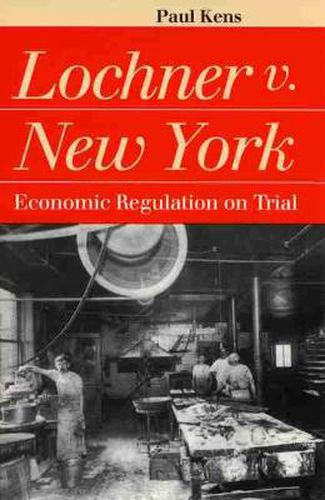Readings Newsletter
Become a Readings Member to make your shopping experience even easier.
Sign in or sign up for free!
You’re not far away from qualifying for FREE standard shipping within Australia
You’ve qualified for FREE standard shipping within Australia
The cart is loading…






Lochner v. New York (1905), which pitted a conservative activist judiciary against a reform-minded legislature, remains one of the most important and most frequently cited cases in Supreme Court history. In this concise and readable guide, Paul Kens shows us why the case remains such an important marker in the ideological battles between the free market and the regulatory state.
The Supreme Court’s decision declared unconstitutional a New York State law limiting bakery workers to no more than ten hours per day or sixty hours per week. By evoking its police power, the state hoped to eliminate the employers’ abuse of these workers. But the 5-4 majority opinion, authored by Justice Rufus Peckham and renounced by Justice Oliver Wendell Holmes, cited the state’s violation of due process and the right of contract between employers and employees, which the majority believed was protected by the Fourteenth Amendment. Critics jumped on the decision as an example of conservative judicial activism promoting laissez-faire capitalism at the expense of progressive reform. As series editors Peter Hoffer and N.E.H. Hull note in their preface, the case also raised a host of significant questions regarding the impetus of state legislatures to enter the workplace and regulate hours, wages, and working conditions; of the role of courts as monitors of the constitutionality of state regulation of the economy; and of the place of economic and moral theories in judicial thinking.
Kens, however, reminds us that these hotly contested ideas and principles emerged from a very real human drama involving workers, owners, legislators, lawyers, and judges. Within the crucible of an industrializing America, their story reflected the fierce competition between two powerful ideologies.
$9.00 standard shipping within Australia
FREE standard shipping within Australia for orders over $100.00
Express & International shipping calculated at checkout
Lochner v. New York (1905), which pitted a conservative activist judiciary against a reform-minded legislature, remains one of the most important and most frequently cited cases in Supreme Court history. In this concise and readable guide, Paul Kens shows us why the case remains such an important marker in the ideological battles between the free market and the regulatory state.
The Supreme Court’s decision declared unconstitutional a New York State law limiting bakery workers to no more than ten hours per day or sixty hours per week. By evoking its police power, the state hoped to eliminate the employers’ abuse of these workers. But the 5-4 majority opinion, authored by Justice Rufus Peckham and renounced by Justice Oliver Wendell Holmes, cited the state’s violation of due process and the right of contract between employers and employees, which the majority believed was protected by the Fourteenth Amendment. Critics jumped on the decision as an example of conservative judicial activism promoting laissez-faire capitalism at the expense of progressive reform. As series editors Peter Hoffer and N.E.H. Hull note in their preface, the case also raised a host of significant questions regarding the impetus of state legislatures to enter the workplace and regulate hours, wages, and working conditions; of the role of courts as monitors of the constitutionality of state regulation of the economy; and of the place of economic and moral theories in judicial thinking.
Kens, however, reminds us that these hotly contested ideas and principles emerged from a very real human drama involving workers, owners, legislators, lawyers, and judges. Within the crucible of an industrializing America, their story reflected the fierce competition between two powerful ideologies.